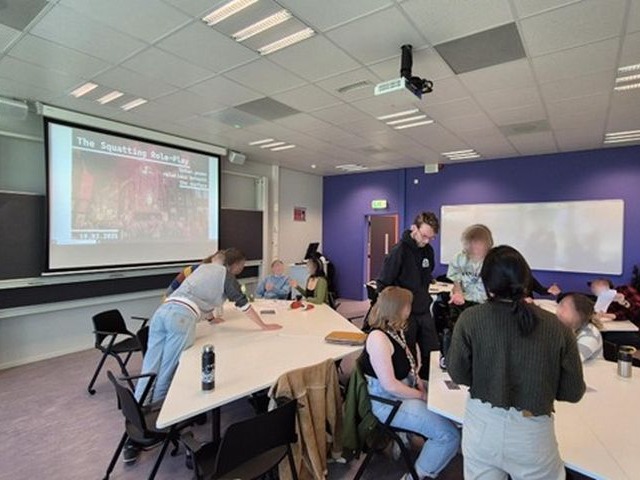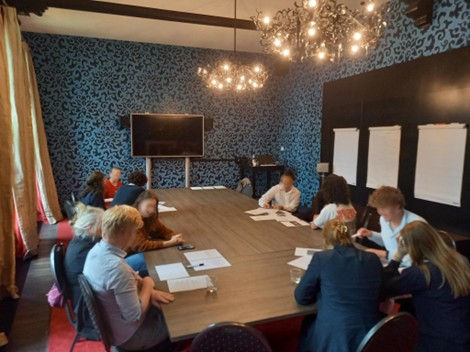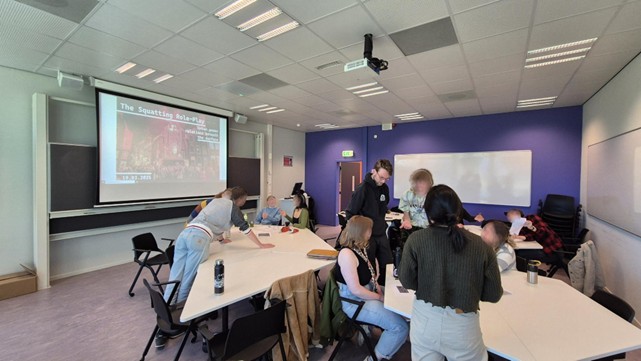The Squatting Role Play: Urban Power Relations beneath the surface

Where property rights clash with the right to housing, where cultural expression becomes a question of justice and where spatial planning meets direct action, ‘the urban’ becomes both the arena and the subject of political struggle. Central to this struggle is the act of squatting. Understood as taking in use a vacant building without the owner's permission, squatting has a long history in the Netherlands. In the 1970s and 80s protests against modernist city renewal, high vacancy rates and a favourable legal situation created the peak of the Dutch squatting movement.
Today, squatting is officially a crime. However, increasing processes of gentrification, commercialisation and housing crisis have led to a revival of the squatting movement from The Hague to Groningen and from Maastricht to Amsterdam. This shows how deeply rooted squatting is in the political culture of the Netherlands and that multiple attempts of preventing it could not decrease its importance for activists, alternatively oriented people and housing seekers alike. Instead, squatters always found ways to adapt and navigate between new laws, trained practices and clashes of various interests, rights and forms of power. With every case of squatting all of this is again and again the matter of strategy and negotiation with a variety of different actors that squatters encounter along their way. These include homeowners, municipalities, lots of neighbours and an endless list of other potential actors from climate activist groups and monumental agencies to investors and petty criminals.
Hands-on: How the Role-Play works
Due to criminalization and prejudices, squatting is however often an inaccessible field for many. This is why I wanted to reconstruct this contested urban arena in a workshop setting to make it both theoretically and practically more tangible for people, who are interested but have had little contact with it so far. To create an active and engaging learning environment the workshop takes place in the form of a role-play game (Rye et al. 2025). It can be played by 5 groups of 2-6 participants each, thus accommodating in total a group of 10 to 30 people. The game requires no particular knowledge, although a basic understanding of urban politics might help. The role play takes place in two stages.
First Stage (30-40 minutes): Each of the 5 groups receives a portfolio of a different vacant building in Groningen, consisting of information on the owner, the building, the story of its vacancy and a couple of pictures, maps, newspaper articles or other small pieces of information. This vacant building will be the squat. Each group has to come up with a name for the squat, a statement why they squatted the building and what they want to realize in or with it. Additionally, the groups should think about their strategy and if and how they want to approach other actors in the second stage.
Second Stage (up to 45 minutes):
-
One group is being picked to keep playing as the squatters, while the other groups change their role to either the owner, the municipality, the neighbours, or a secret actor. All groups receive new instructions with a bit of background knowledge on their role and their connection to the building, as well as their interests and a set of possible actions.
-
The squatters start off the second stage by “getting public” and reading out their statement.
-
Now the arena is open for all parties to engage and interact with each other, by reacting to the squatters while simultaneously trying to pursue their own interests. This process is organized in two public rounds in which actors can make statements and perform actions, as well as a time slot in between for informal negotiations between actors.
The second stage ends if the squat is evicted or has been able to achieve a relatively stable situation. Practically this can be achieved by the following outcomes:
-
Squatters and owners agree on a (temporary) use
-
A criminal court case has been started (and lost/won)
-
A civil court case has been started (and lost/won)
-
A “stalemate”: No court case or agreement, the squatters remain in a semi-stable situation
-
For a court case the host can function as a judge and give a best estimate and/or simply throw a coin.
The second stage can be repeated with picking another group from the first stage and redistributing roles.
Counterculture, Collaboration and Community Building: The Learning Objectives of the Workshop
In the first stage, participants become familiar with the concept of (political) squatting, counterculture and the role that squatting plays in this. In essence what the first stage shows is that counterculture is what the people come up with and create by themselves and in interaction with each other (Boer 2023). These creations can be carried out by political conviction, self-fulfilment, solidarity etc. (Ibid.). Squats play a central role in this since the expression of counterculture as well as general political expressions often requires space for visibility and attention but also for organisation and creation (Novy & Colomb 2013; d'Ovido & Cossu 2017, Mokum Kraakt! 2023). The first stage can also show different motivations to squat across the groups (Pruijt 2013, Martinez 2020).

The second stage participants learn about and experience the power relations that play out in squatting, how rights are negotiated and how to organize strategically. All actors find themselves in a position where they have to pursue their interests using their various forms of power, which are often restricted by means or other (long-term) interests. The ideological power of the municipality is restricted by their public image and their interest to also foster culture (Tonkiss 2020, Moroni 2020) and the squatters have to build up their power in the first place. It therefore becomes clear in the role-play that actors are dependent on each other and profit from working together. For the homeowner, having the back of the municipality to protect their property is of advantage while squatters can gain democratic and economic power when they build up a community and unite with neighbours and various groups or organizations.
But also actors with generally clashing interests can collaborate in so-called temporary coalitions, meaning situations in which two or more actors that actually follow different agendas can in some way benefit from the same action and therefore profit to cooperate for a short time (O'Callaghan&Di Feliciantonio 2021, O'Callaghan 2024). These temporary coalitions can be made in formal or informal ways and can also vary a lot in the time and extent of collaboration (O'Callaghan et al. 2018). An example here would be a user agreement between owners and squatters, which states that the squatters can stay until actual plans for the building are about to be carried out. While these cases are possible in the role-play, what is not visible is that often these temporary coalitions have consequences for the long-term political strategy of each actor. Since squatting happens in a legally grey area with informal norms and conventions, shifting these practices in turn can shift power relations over time. Therefore, in reality, it is hard to view a single case of squatting isolated from the whole movement. This can be a topic for a moment of reflection after the roleplay. In this reflection also questions around expectations, perceived influence and experienced power can lead to further interesting learnings.
A process of continuous improvement: The development and experiences with the Workshop

The role play has been tested and improved a couple of times. As the first version, the first stage was developed with a fellow squatter for a workshop day of the study association of history “Ubbo Emmius” on 14.06.2024 (Image 1). During the FSS course “City Matters” I further developed the role-play by adding the second stage and aligning it more with theoretical aspects. After another test round (Image 2) and further adjustments the workshop was included during a lecture of the UCG course “The City” on 30.05.2025.
In all these workshops groups enthusiastically engaged in the first stage and came up with a huge variety of ideas. Also, the courses of the second stage were always different and showed that all actors have the potential to influence the role-play. To guarantee that every actor is equally heard and can exploit their potential, it proved effective for the host to steer the conversation and especially hold the squatter’s group back who otherwise might dominate the discussion.
Further experiences by the hosts have shown that it is helpful to balance out pre-existing knowledge across the groups, to keep an organized balance between “formal” and “informal” parts (the public rounds and the informal negotiations round in the second stage). The experiences by participants have been consistently positive, stating that it was both fun and also an effective learning experience. The feedback also positively highlighted the active involvement of all actors which are forced to engage and take a stance.
This text has been crafted by Nils Müller building on student work in the course 'City Matters: Urban Inequality and Social Justice’ at the University of Groningen, Faculty of Spatial Sciences. The course was taught by Christian Lamker, Sara Özogul, and Sander van Lanen, between September and November 2024 as a compulsory course for Master students in the programme Society, Sustainability and Planning (SSP), the connected Double Degree Programmes, and as an elective to other Master programmes of the Faculty and the University. Nils Müller studies in the Research Master (ReMa) Spatial Sciences.
References:
Boer, R. (2023) Kraken in de Smooth City. In: Mokum Kraakt! (eds.) (2023). Pak Mokum Terug: Woonstrijd in een krakende stad. Starfish Books: Amsterdam
Martínez, M. (2020). Squatters in the capitalist city : housing, justice, and urban politics. New York: Routledge
Mokum Kraakt! (eds.) (2023). Pak Mokum Terug: Woonstrijd in een krakende stad. Starfish Books: Amsterdam
Moroni, S. (2020). The just city. Three background issues: Institutional justice and spatial justice, social justice and distributive justice, concept of justice and conceptions of justice. Planning Theory, 19(3)
Novy, J.&Colomb, C. (2013). Struggling for the Right to the (Creative) City in Berlin and Hamburg: New Urban Social Movements, New ‘Spaces of Hope’?. International Journal of Urban and Regional Research 37(5)
O'Callaghan, C., Di Feliciantonio, C. (2021). The new urban ruins : vacancy, urban politics and international experiments in the post-crisis city. Bristol, UK : Policy Press
O’Callaghan, C. (2024). Rethinking vacancy within the urbanization process: towards a new research agenda. Urban Geography, 45(5)
d'Ovido, M.& Cossu, A. (2017). is reclaiming the creative city: The case of Macao in Milan, Italy.
City, Culture and Society 8
Pruijt, H. (2013). The Logic of Urban Squatting. International Journal of Urban and Regional Research, 37(1)
Rye, S., Sousa, M., Sousa, C. (2025). Designing Effective Learning Games. In: Transformative Learning Through Play. Palgrave Macmillan, Cham.
Tonkiss, F. (2020). City government and urban inequalities. City, 24(1-2)


